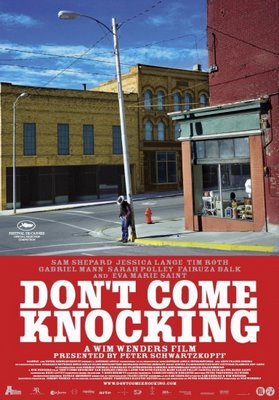
Wim Wenders has a way of catching you off-guard. Here to promote his latest film, "Don't Come Knocking," the director meets me with the opening line: "Are you related to Emmerichs of Frankfurt?" His crisply Teutonic enunciation makes it clear that he's referring to the original German spelling of the surname.
Well, yes, according to ancestral lore, everyone with this last name is related somehow. Anticipating the next question, I volunteer that the maternal side of my family hails from south of the border.
"Ah, German and Mexican, that's a good combination. It was responsible for the birth of mariachi music," says Wenders, who then launches into a mini-lecture about Maximilian, the Austrian-born emperor of Mexico (1864-67), under whose rule the ensembles now associated with Mexico's defining sound first sprang up.
The whole exchange wouldn't be out of place in Wenders' quirky "Don't Come Knocking," which abounds with quixotic moments, including a film within the film that looks like a remnant from the old Republic Studios backlot.
"Don't Come Knocking," shot in 35 days for $10 million, reunites Wenders with his "Paris, Texas" partner Sam Shepard, who wrote the script and also stars as Howard Spence, a burned-out actor who decides to flee from the set of his latest film, "Phantom of the West." He embarks on a journey of redemption and self-discovery that starts in Moab, Utah -- the iconic locale celebrated in the films of John Ford -- and continues through remote outposts such as Elko, Nev., and Butte, Mont. Whether nursing emotional wounds or trying to settle old scores, Spence represents the archetypal Wenders hero: "A man, alone and isolated, wanders the cities of the world in search of truth either large or small" -- as one critic once put it.
One of the greatest directors of the new German cinema movement, Wenders, 60, loves the American landscape, especially the Old West, and has shot many of his films here, including "Hammett" (1982), "The End of Violence" (1997), "Land of Plenty" (2003), as well as "Paris, Texas" (1984).
Wenders credits 19th century author Karl May, who never left Germany but wrote over 60 books, for his love of the Old West. "Through his work, I felt the West belonged to me," he says. "Eighty percent of my hometown was destroyed after World War II. Germany was down and defeated and unsure of itself. It led to a joyless atmosphere. Then I realized that joy came from American culture -- movies, comic books, Westerns. All confirmed my belief that there is a promise in America."
Another favorite author led Wenders to Butte, Mont., the former boomtown now left desolate, which serves as the central locale of "Don't Come Knocking." "In his first novel, Red Harvest, Dashiell Hammett based the mythical town of Poisonville on Butte," he says. "I love that city, and I think it shows in 'Don't Come Knocking.' I wanted to film there for 25 years, and I was hoping that no one else would get there first. Aside from Evel Knievel" -- referring to the motorcycle daredevil and Butte native -- "no one ever did."
Knievel is just one of several unexpected names that pops up in Wenders' conversation: Bob Dylan. Bono. Anthony Mann. Because of his modified pageboy, Wenders recalls another unexpected figure: the madcap mod Peter Sellers, resplendent in an outre wig, in "What's New, Pussycat?" (1965). And with his interesting past (six marriages) and eccentricities (a penchant for wearing mismatched shoes), Wenders occasionally can be just as wiggy.
For instance, he cites Mann (1906-67) -- not Ford or Howard Hawks, as might be expected -- as his favorite Westerns director. Best remembered for his work with James Stewart ("The Naked Spur" and "The Man From Laramie"), the versatile Mann also made film noirs and historical epics. "Mann is the first director whose work I saw in its entirety, so I got to know his craft," Wenders says. "He's still the best. I love his 'Man From the West' and 'Bend of the River.' He really shot in these places. He has such an incredible sense of geography, but he also makes fairy tales."
With segments bordering on the surreal, "Don't Come Knocking" approaches the realm of the fairy tale at times. Witness the extended scene where Howard sits on a couch, heaved from a second-story window by his newly discovered son, in the middle of a deserted street. The character of Howard, however, is rooted in reality.
"Sam and I based him on a real-life actor, but I won't reveal the name," Wenders says. "It's a self-indulgent existence. Show biz is made for that. In the movie of his own life, Howard is not even a supporting character."
That can't be said about Wenders, who remains involved in virtually aspect of his projects. Now that he's made three films back to back, however, he's looking to take a break.
"It took so long to make this film [five years], I really exhausted myself. I think I've said everything I have to say about America."


Nenhum comentário:
Postar um comentário